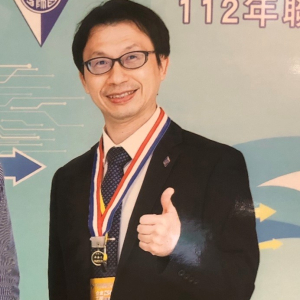

Kevin C.-W. WU 吳嘉文
Title: Distinguished Professor
Telephone: 02-33663064
E-Mail: This email address is being protected from spambots. You need JavaScript enabled to view it.
Office: Room 117A, Dept. Chem. Eng.
Lab: Functional Nanoporous Materials Lab (Room 504,516,517 of Biotechnology Building)
Lab homepage: https://fnmkevinwu.wordpress.com/
Education:
2005 | PhD, Materials Science & Engineering, The University of Tokyo, Japan
2000 | Master, Agriculture chemistry, National Taiwan University, Taiwan
1998 | Bachelor, Agriculture chemistry, National Taiwan University, Taiwan
Experience:
2016-present | Professor, Dept. of Chem. Eng., National Taiwan University
2010-present | Joint Appointed Investigator, National Health Research Institutes, Taiwan
2012-2016 | Associate Professor, Dept. of Chem. Eng., National Taiwan University
2013-2016 | Vice chair, The Center of Strategic Materials Alliance for Research and Technology Vice chair, The Center of Strategic Materials Alliance for Research and Technology (SMART Center), National Taiwan University, Taipei, Taiwan
2008-2012 | Assistant Professor, Dept. of Chem. Eng., National Taiwan University
2006-2008 | Post-doc, Dept. of Chem., Iowa State Univ., Iowa, USA
2005-2006 | Post-doc, Dept. of Applied Chem., Waseda Univ., Tokyo, Japan
Honors & Awards:
2014 | The Distinguished Lectureship Award, The CSJ Asian International Symposium, Nagoya, Japan.
2015 | Wu Da-Yu (吳大猶獎) Award, Ministry of Science and Technology (MOST), Taiwan.
2012-present | Editorial Board, Advanced Powder Technology (Elsevier).
2015-present | Editorial Board, Scientific Reports (Nature Publishing Group).
2016 | The Best Paper Award in the Catalysis Society of Taiwan.
2016 | The SCEJ Award for Outstanding Asian Researcher and Engineer.
2017 | Lai Zia-Te (賴再得獎) Award, Taiwan Institute of Chemical Engineers, Taiwan.
2017 | Outstanding Young Chemist (傑出青年化學家獎) Award, Chemistry Society of Taiwan.
2017-present | Editorial Board, Journal of the Taiwan Institute of Chemical Engineers (Elsevier).
2018 | Editorial Board, ACS Sustainable Chemistry & Engineering (ACS).
2018 | Humboldt Foundation Fellow (Germany).
2018 | MOST Outstanding Research Award (科技部傑出研究獎).
2019: ACS Sustainable Chemistry & Engineering Lectureship Award (ACS)
2019: Outstanding Researcher Award (Asia-Pacific Association of Catalysis Societies; APACS)
2019: Outstanding Young Scholar Award, LCY Education Foundation.
2020: Outstanding Research Award, Ministry of Science and Technology, Taiwan.
2021: Clarivate Highly Cited Researchers (Cross-fields)
Research Highlight
Fields of specialty
Metal-Organic Frameworks (MOFs); Renewable Energy; Heterogeneous Catalysis; Nanoporous Materials; Sustainable Chemistry & Engineering; Biomass Conversion; Membrane Separation.
The research field can be divided into two major categories: Green Energy Applications and Biomedical Applications.
In Green Energy Applications, our focus is primarily on utilizing Metal-Organic Frameworks (MOFs) as catalysts for biomass energy conversion. This involves the transformation of biomass materials into Tris(5-methyl-2-furyl)methane (TriM), followed by inducing an oxidation-reduction reaction through the application of voltage, resulting in electrochromic behavior. Additionally, MOFs can be prepared as continuous two-dimensional films for ion-selective membranes, enabling osmotic power generation. Furthermore, this field encompasses the high-value utilization of plastic waste through thermal decomposition, yielding carbon sources for the production of high-value single-walled carbon nanotubes.
In the realm of Biomedical Applications, our primary focus lies in harnessing biocompatible Metal-Organic Frameworks (MOFs) as carriers. These carriers are employed for various applications, including the encapsulation and targeted delivery of magnesium ions to facilitate bone repair. This approach proves effective in enhancing bone regeneration processes. Furthermore, we utilize near-infrared light to release encapsulated drugs for tumor treatment. Subsequent developments have expanded the applications to include the treatment of edema in limbs and the purification and separation of proteins.
Representative publications:
- Yuyuan Huang, Hannelore Konnerth, Jyun-Yi Yeh, Martin H. G. Prechtl, Cheng-Yen Wen, and Kevin C.-W. Wu*. De novo synthesis of Cr-embedded MOF-199 and derived porous CuCr2O4/CuO composites for enhanced phenol hydroxylation. Green Chemistry. 2019, 21, 1889-1894. Selected as Front Cover.
- Yu-Te Liao, Nguyen Van Chi, Nozomu Ishiguro, Allison P. Young, Chia-Kuang Tsung,* and Kevin C.-W. Wu*. Engineering a Homogeneous Alloy-Oxide Interface Derived from Metal-Organic Frameworks for Selective Oxidation of 5-Hydroxymethylfurfural to 2,5-Furandicarboxylic Acid. Applied Catalysis B: Environmental. 2020, 270, 118805.
- Hannelore Konnerth, Babasaheb M. Matsagar, Season S. Chen, Martin H.G. Prechtl, Fa-Kuen Shieh,* Kevin C.-W. Wu.* Metal-organic framework (MOF)-derived catalysts for fine chemical production. Coordination Chemistry Reviews. 2020, 416, 213319. (IF: 13.476)
- Jyun-Yi Yeh, Season S. Chen, Shih-Cheng Li, Celine H. Chen, Tetsuya Shishido, Daniel C.W. Tsang, Yusuke Yamauch, Yi-Pei Li, and Kevin C.-W. Wu.* Diels-Alder Conversion of Acrylic Acid and 2,5-Dimethylfuran to para-Xylene over Heterogeneous Bi-BTC Metal-Organic Framework (MOF) Catalysts under Mild Conditions. Angewandte Chemie International Edition. 2021, 60, 624-629. Very Important Paper. Selected as Front Cover.
- Yi-Cheng Liu, Li-Hsien Yeh,* Min-Jie Zheng, Kevin C.-W. Wu.* Highly Selective and High-Performance Osmotic Power Generators in Subnanochannel Membranes Enabled by Metal-Organic Frameworks. Science Advances. 2021, 7, eabe9924.



